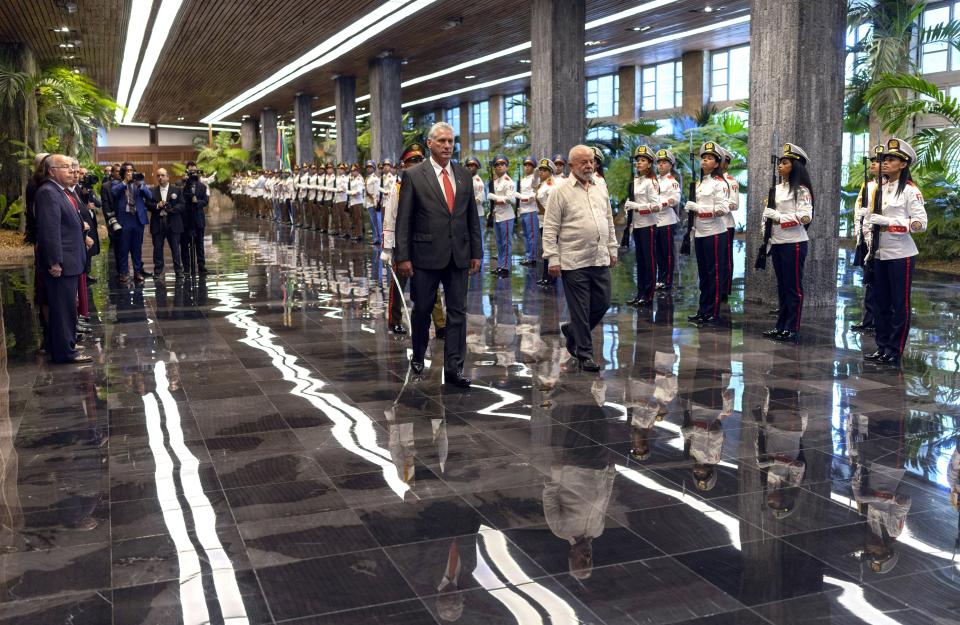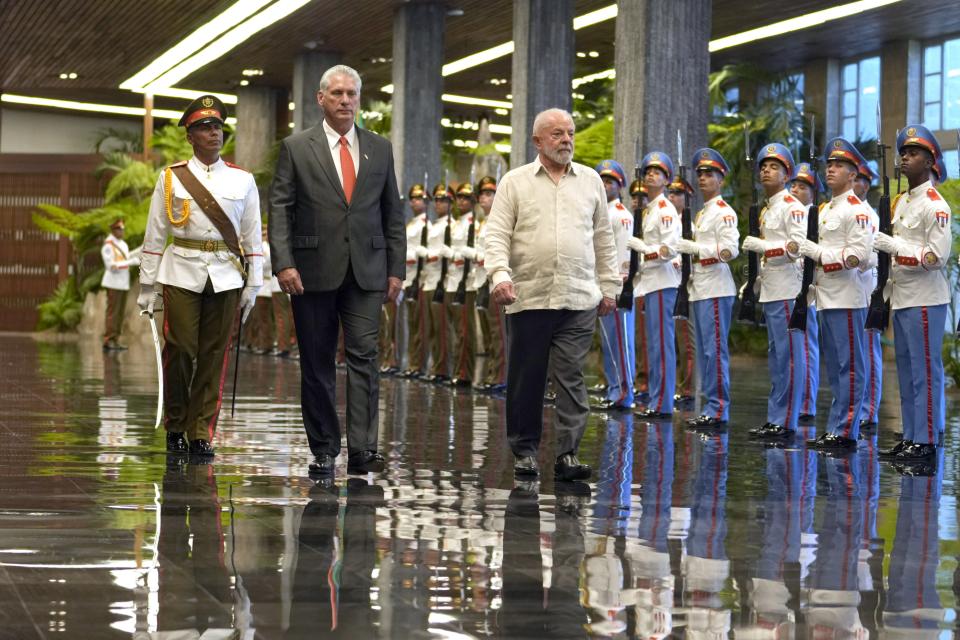Brazilian leader Lula rekindles ties with Cuba at G77 summit in Havana
RIO DE JANEIRO (AP) — Brazilian President Luiz Inácio Lula da Silva met with his Cuban counterpart Saturday in Havana, signaling a revitalization of ties between the two countries in the first trip by a Brazilian president to the Caribbean nation in nine years.
Lula was in Havana for the summit of the Group of 77 emerging economies plus China. The group, founded in the 1960s, is meeting in Cuba just days ahead of the U.N. General Assembly in New York.
Addressing the summit Saturday, Lula lamented the U.S.-led embargo of Cuba. The island “is the victim of an illegal economic embargo. Brazil is against any unilateral coercive measure,” he said.
“We reject the inclusion of Cuba on the list of state sponsors of terrorism,” he added. Lula was referencing the U.S.’s list of countries it considers to have repeatedly provided support for acts of international terrorism. Countries on the list are subject to sanctions.
Cuba and Brazil share strong historical and demographic ties. Brazilian soap operas are popular in Cuba, and both have rich musical traditions.
Lula and former Cuban leader Fidel Castro were friends, and Lula's narrow victory over former far-right president Jair Bolsonaro in last year’s election was celebrated in Cuba.
The event in Havana was an opportunity “to officialize the reestablishment of political and diplomatic relations with Cuba that were completely abandoned during the Bolsonaro administration,” said Paulo Peres, a political scientist at the Federal University of Rio Grande do Sul.
Ties were strong between the two countries when Lula’s leftist Workers’ Party was in power between 2003 and 2016 but turned sour under Bolsonaro, who was in favor of the embargo.
Lula and Cuba's leader Miguel Díaz-Canel were expected to discuss Cuba’s debt to Brazil’s development bank. Reported by the Brazilian press to stand at around $540 million, the debt was mainly amassed during huge works on Cuba's Port of Mariel, located approximately 40 kilometers (25 miles) west of Havana.
Cuba stopped paying the loan in 2018. Bolsonaro allies on the far-right regularly used the issue to accuse Lula of preferring to build a port in communist Cuba rather than finance national projects.
“The successful recovery of the funds lent to Cuba to finance works carried out by Brazilian companies on the island will be relevant to counter the opposition’s criticism of the Workers’ Party,” said Antonio Jorge Ramalho Da Rocha, a professor of international relations at the University of Brasilia.
Lula is also very interested in increasing Brazilian companies’ use of the port and making the most of its infrastructure to facilitate international commerce with the Caribbean and the U.S., said Peres.
An expansion of trade links between the two countries is also expected to be on the agenda. In 2022, Brazil had a trade surplus of approximately $287 million with Cuba, according to a January statement by Brazil’s foreign affairs ministry. Brazil principally exported vegetal fats and oils, rice and poultry meat.
Cuba is in the throes of what some experts have called its gravest economic crisis since the Cuban Revolution in 1959. While increased imports of a range of goods would be welcome on the island, the Cuban government is widely thought to lack the funds to pay.
But Cuba is also going through a transformation process, with the opening of small and medium-sized private companies. Since small ventures became legal in September 2021, more than 8,000 companies have been launched in Cuba.
The two leaders were also likely to discuss Brazil’s “More Doctors” program, said Peres. Launched in 2013, the initiative recruited doctors from abroad to work in remote areas of the country where there was a lack of health care services.
Bolsonaro criticized the program, which led to its hasty suspension in the early days after his election in 2018.
Both countries have an interest in restarting “More Doctors,” said Peres. Cuba’s cash-strapped government would welcome the income from the doctors’ salaries, while Brazil continues to suffer from a lack of health care professionals in rural areas.
Bolsonaro had little interest in international affairs. Since taking office in January, Lula has been seeking to project Brazil as a major player on the global stage.
Part of that strategy has been to take numerous international trips, during which Lula has pushed for a revamping of the global world order in favor of more power to Global South countries.
After his trip to Cuba, Lula will head to New York, where he will give the opening speech of the U.N.’s General Assembly and meet with President Joe Biden in a bilateral meeting.

 Yahoo News
Yahoo News 

